#nonpresidential
Explore tagged Tumblr posts
Text
I see a lot of haters mocking the "just vote blue" strawman online this week.
I don't know anybody who was saying or thinking "voting blue is all you have to do". Nobody thinks that electing a democrat will "fix the country" or make our problems go away.
We are screaming about voting because it's the bare minimum, entry level, welcome to adulthood part of the political process and people STILL DON'T GO TO THE POLLS!
Look at the numbers from the 2024 primaries. Every single one of these elections had a dozen or so ADDITIONAL RACES being decided, some even had ballot measures and special elections added in but the turn out was TERRIBLE!

And the 2022 mid terms where the Democrats lost the House seats?
Voter turnout for the 2022 U.S. congressional elections was the second highest for a nonpresidential election year since 2000, with 52.2% of the citizen voting-age population participating.
"Just over half" was a RECORD!
You haters need to focus your energy on activism that doesn't involve attacking your allies. those of us trying to get people to vote aren't the problem.
And if you haven't done so this month, make sure to make sure you're registered.
#us politics#division has always been the greates weakness of the opposition#democrats and liberals and socialists and progressives and whatever label you want to use because you're not one of THEM#get over yourselves and work together
18 notes
·
View notes
Photo

@blklivesmatter #racism is #wrong #acrosstheboard &&&&& y'all dumbass parents & grandparents been #lying about their INTERACTIONS in #politics in #nonpresidential #electionyears told y'all 😒🙄 #voteforeverything #state #localoffice #county because #policy is made in the fucking #offseason Since y'all have issue 🙄with #asians I CANNOT CHOOSE TO #hushmymouth because I ADORE the ones I f with. #closeminded is always the problem 🙄 it's never #openmindedness 🙄that's the issue. Now. You #hatingassbitches #hatingassniggas #teamlightskin #teamdarkskin fools - what y'all doing in #2022 ?? Staying in #lasvegas with #lasvegaslocals #locallasvegas isn't the brightest idea y'all have. Too many here 😪 either CAN PASS or they are the parents TO THOSE THAT CAN PASS... y'all hateful because you ended up being proven to be WRONG. Loudly. & in multiple ways. Y'all hate yourselves. Get away from me & my damn 😒 adopted #hometown You #blackbitches ??? Bragging about 🤔 the nigga take care of the KID y'all have with him BUT ALSO BRAG about how 🤔the otherbabymomma pissed because the #lameass DON'T take CARE OF THE ONES HE HAS WITH HER???? #trifling ass bitches 🤣😒 #esl bruhhhhh... told y'all I ain't have shit in common with them 🤣 EXCEPT being the same Color & from the same place (at Las Vegas Nevada) https://www.instagram.com/p/CWgtvperpBt/?utm_medium=tumblr
#racism#wrong#acrosstheboard#lying#politics#nonpresidential#electionyears#voteforeverything#state#localoffice#county#policy#offseason#asians#hushmymouth#closeminded#openmindedness#hatingassbitches#hatingassniggas#teamlightskin#teamdarkskin#2022#lasvegas#lasvegaslocals#locallasvegas#hometown#blackbitches#lameass#trifling#esl
0 notes
Link
“History never repeats itself. But there’s already compelling evidence that Texas Republicans understand how detested their new abortion law will soon be—not only in New York City and Los Angeles, but also in Houston, Dallas, San Antonio, Austin, and Fort Worth. They took the precaution of preceding the nation’s most restrictive abortion law with one of the nation’s most suppressive voting laws. It’s as if they could foresee what Texas would do to them if all qualified Texans could vote. But the Texas voting law only impedes voting; it does not prevent it. The 2020 election showed that voter suppression can only do so much to protect a sufficiently unpopular incumbent. In the off-year elections of 2014, Republicans won a huge victory. In 2018, they suffered a huge defeat. The crucial difference was turnout: 2014 saw the lowest turnout since 1942; 2018 saw the highest in a nonpresidential year since before World War I. The moral of the story would seem to be that Republicans do best when the electorate is satisfied and quiet; they face disaster when the electorate is mobilized and angry. Texas Republicans have just bet their political future in a rapidly diversifying and urbanizing state on a gambit: cultural reaction plus voter suppression. The eyes of Texas will be upon them indeed. The eyes of the nation will be upon them too.“
#texas#republican party#abortion#gerrymandering#voter suppression#2022 midterms#2022 election#vote blue no matter who#VOTE
6 notes
·
View notes
Text
My anxiety is ramping up too, just because I have no idea what to expect. I don't live in a very large area but it's Republican heavy and they're more likely to vote on the actual day. Also it's super likely there will be Trump demonstrators around the polling place which just makes me uncomfortable.
The closer we get to election day here in the U.S the worse my anxiety gets. To make it worse, I'm voting in person (Because I want to be 100% confident that my vote is counted) and I'm voting alone due to the fact that my mother will be out of town taking care of health concerns. Just hoping that there won't be a blizzard where I am and I can get to the polls.
36 notes
·
View notes
Link
Sarah Lyall. “When a Leader Just Won’t Go: Wisdom from Shakespeare to Dickens to ‘Seinfeld’ on President Trump’s Long Non-Goodbye.” New York Times. Nov. 15, 2020.
In Nancy Mitford’s comic 1960 novel “Don’t Tell Alfred,” the wife of the new British ambassador to Paris arrives at the embassy to find that she has a vexing problem: Her predecessor has refused to move out.
Indeed, Pauline Leone, the wife of the previous ambassador, is so unhinged by the prospect of a status-free future that she has set up her own rival court, grandly receiving a stream of visitors as if for all the world she were still Madame L’Ambassadrice, the social arbiter of Paris.
“At the beginning one thought it was a lark — that in a day or two she’d get tired of it,” a British official says crossly. But no. “She’s having the time of her life,” he adds, “and quite honestly I don’t see how we shall ever induce her to go.”
As the nation ponders the awkward case of Donald J. Trump, a president who will not admit that he has been fired, it is helpful to consider him through the experiences of other people, fictional and otherwise, who have been unable to accept the arrival of unwelcome developments in their personal and professional lives.
Is Trump like King Lear, raging naked on the heath and desperately hanging on to the increasingly diminished trappings of power even as they are stripped from him? Or is he more like Bartleby the Scrivener, the inscrutable model of passive resistance who one day declines to do any more work or indeed leave the building, declaring: “I would prefer not to?”
Is he like Nellie, the character in “The Office” who installs herself at the desk of the regional manager when he is out of town and unilaterally appoints herself boss? Or how about George from “Seinfeld,” who quits one of his many jobs in a huff, unsuccessfully tries to get it back, and reports to work anyway, as if nothing had happened?
Timothy Naftali, a history professor at New York University, said that one way to view Mr. Trump would be as a version of Miss Havisham, the jilted bride from “Great Expectations” who lives forever in the past, never taking off her tattered wedding gown even as her house decays around her.
“He’s wearing the cloak of the presidency and he’s stuck in his room, getting dusty, while everyone else has moved on,” Mr. Naftali said.
No president in American history has ever before refused for so long to concede an election he has obviously lost. But when it comes to hanging on to an alternative version of reality, Mr. Trump has plenty of nonpresidential company.
There was Eteocles, a son of Oedipus in Greek mythology, who remained on the throne of Thebes, reneging on his promise to share it with his twin brother, leading to a battle in which they killed each other.
There was Gov. Edmund J. Davis of Texas, a Republican, who refused to leave office after losing the election of 1873, claiming that he had several months left in his term and barricading himself on the ground floor of the State Capitol. (The newly elected governor and his supporters installed themselves on the first floor, using ladders to enter through the windows.)
There was the Hiroo Onoda, the Imperial Japanese Army officer who would not surrender after the end of World War II, remaining in combat-readiness in the jungle for 29 years until his by-then elderly former commanding officer arrived and rescinded his no-surrender order.
And there was the entire government of Moldova, which in 2019 decided not to make way for a new government, leading to a bizarre situation in which both groups claimed for a time to be in charge of the country. The impasse finally ended when the former prime minister grudgingly stepped down in the face of growing national outrage and international pressure.
While American presidential transfers of power have traditionally been smooth, well-run affairs, world history is replete with examples of dictators and strongmen employing nefarious means to remain in office. Sometimes such rulers refuse to accept the results of honestly conducted elections. Sometimes they throw out term limits, and just keep on governing. Sometimes they jail, torture, kill or disappear their political opponents. (Sometimes they do all of those things.)
Mr. Trump has spoken admiringly about at least some of these practices, saying, for instance, that he was “probably entitled” to a third term “based on the way we were treated.” (That was before he lost the election.)
But given the news wafting like the occasional smoke signal from the White House, where some of the president’s advisers and relatives are reportedly attempting various psychological techniques to get Mr. Trump to accept the fact that he is now a lame-duck president, his behavior seems less like a putsch and more like an extended whiny tantrum. As Dan Rather, an elder statesman of American journalism,Dan Rather, said on Twitter: “Dude. You lost.”
7 notes
·
View notes
Quote
Mr. President, your tweet was beneath the office and represents what is wrong with American politics, not the greatness of America.
Senator Lindsey Graham (R-SC) was among the stream of Republicans condemning the two-tweet attack POTUS 45 made on MSNBC's "Morning Joe" co-host Mika Brzezinski.
#politics#45thesnob#GOP#MSNBC#Morning Joe#MikaBrzezinski#personalattack#nodignity#nonpresidential#beneaththeoffice
0 notes
Quote
Wim Laven arrived to his polling location in Atlanta’s northern suburbs this week unsure what to make of recent allegations of voter difficulties at the ballot box. Then he waited two hours in the Georgia sun; saw one person in the line treated for heat exhaustion; and watched a second collapse, receive help from paramedics, yet refuse to be taken to the hospital — so he could remain in line and cast his ballot. Mr. Laven is now a believer. “I have a hard time imaging this is anything but an intentional effort,” said Mr. Laven, who teaches political science at Kennesaw State University. “I can’t imagine this is just pure incompetence. Everyone knew how serious people have been around here about getting out the vote.” As Georgians cast their first in-person ballots on Monday in the state’s fiercely contested gubernatorial election, what were once hypothetical fears about the state’s inability to handle what could be a record turnout for a nonpresidential election may be becoming reality. Vote totals have increased almost 200 percent at the same point since the last gubernatorial election, according to the independent tracker Georgia Votes, but many worry the state has either failed to adequately prepare for such increased interest or Republican state officials have intentionally mounted barriers to dissuade communities of likely Democratic residents from voting. Some of the concerns reflect longstanding complaints, such as reduced polling locations, confusion among election workers, and outdated voting machines which may soon be deemed illegal. Since 2012, more than 200 local voting precincts have been closed across the state of Georgia, which amount to about 8 percent of the state’s total polling places. But there are also allegations of intentional voter suppression, which has become a central issue in the governor’s race. A recent report by The Associated Press detailed how Georgia Secretary of State Brian Kemp, who is also the Republican nominee for governor, had stalled more than 50,000 voter registrations of disproportionately black voters because of alleged problems with their voting registration information.
Georgia Voting Begins Amid Accusations of Voter Suppression - The New York Times
7 notes
·
View notes
Link
via Politics – FiveThirtyEight
The stakes of the 2018 midterms seem huge. Democrats believe they can win back control of the U.S. House — maybe even the Senate — and move policy decidedly to the left. Then they’ll set their sights on the White House in 2020, dreaming about what they could accomplish with full control of government — and how much voters would reward them.
But perhaps Democrats shouldn’t get their hopes up too much. Republicans now control all branches of government but have scored only one major legislative victory, and they are facing a substantial backlash. The GOP’s current situation raises these questions: Can either political party maintain power while enacting its agenda? Or are governing majorities transient, with policy victories sowing the seeds for future electoral losses?
The evidence we have suggests the latter. When Democrats historically have tried to enact a spate of liberal policies, Republicans have made gains and public opinion has moved in a more conservative direction. Likewise, when Republicans have passed more conservative policies, Democrats have made gains, and public opinion has moved in a more liberal direction. It might not sound intuitive, but policy victories usually result in a mobilized opposition and electoral losses. Or, put another way, voters usually punish rather than reward parties that move policy to achieve their goals.
To measure this, I used an updated categorization of major laws since 1953 from “The Macro Polity,”1 which codes laws as liberal (expanding the scope of government responsibility), conservative (contracting the scope of government) or neither. For example, the Civil Rights Act of 1964 extended government protections, so it is coded as liberal law; the 1981 Reagan tax cut downsized the federal tax code, so it is coded as conservative law. This involves some judgment calls; if the authors of “The Macro Polity” thought a law was clearly liberal or conservative based on contemporary politics, they coded it to account for those realities. So even though abortion restrictions (or pro-life laws) can mean more government intervention, they are coded as conservative because they reflect conservative politics.2
In the chart below, I plotted the relationship between the net number of liberal laws3 passed by each Congress and the change in the Democrats’ share of the popular vote in the House from the previous election. It is not a perfect relationship (the correlation is -0.47), and there were outliers, including the 1964 election following the Kennedy assassination and the 1974 election after Watergate.
But there were three cases that seemed to capture electoral fallout from high levels of liberal policymaking. Democrats last completely controlled the federal government in 2009-10 and used that control to enact a long list of policy priorities — only to be met with a massive electoral backlash in the 2010 midterms. Two other elections with the largest changes in partisan vote share from the prior election were in 1966, after Lyndon Johnson’s Great Society, and in 1994, following Bill Clinton’s initial legislative agenda.
It is not any easier for Republicans. They, too, have lost congressional seats and pushed public opinion to the left when they succeeded in shifting policy even a little to the right. Democrats have gained vote share after every Congress that passed more conservative than liberal laws. It’s notable that GOP-controlled governments haven’t tended to push overall policy that far to the right. Republican presidents have typically paired their conservative policies with liberal compromises — such as George W. Bush’s tax cuts along with a new health entitlement. The current Congress would be an outlier, even among those under Republican presidents, in pursuing no liberal laws.
So why do American politics seesaw back and forth? Some of what I’ve captured might be attributed to the well-known phenomenon of midterm loss: The party of the president tends to lose seats in a nonpresidential election. But it is unclear if midterm electoral backlashes are a certainty or a response to a president’s specific policy agenda. This can be hard to disentangle as new presidents often pursue big agendas in the hopes of shaping policy in their ideological mold.
For instance, after campaigning on health care helped President Obama win votes in 2008, voters in the 2010 election punished legislators who supported the Affordable Care Act because they came to view the policy and the legislators as too liberal. But backlashes may materialize even when large agenda items fail to pass, such as the response to Clinton’s health care proposal in the 1994 election or to Bush’s Social Security proposal in the 2006 election.4
But there is a deeper problem: Neither party seems capable of sustaining a public majority to carry out its governing vision to completion. Today’s governing majorities are simply too narrow and short-lived to restructure government. The parties have recently swapped who commands the Oval Office and regularly compete for control of the House and Senate. Despite predictions of one-party dominance, both parties remain competitive.
This reflects the American public’s inconsistent views. Americans have long-agreed with Republicans in broad symbolic terms while agreeing with Democrats in concrete policy terms. Politicians promise that they will win over converts with their policy success, but the public nearly always becomes more liberal during Republican presidencies — as it is doing now — and more conservative under Democratic rule (as it did under Obama).
Partisans tell themselves that this time will be different, that the final vanquishing of their opponents is just around the corner. But even maintaining a narrow majority for more than four years would be unprecedented of late — much less winning a long-term partisan war. Rather, the historical record suggests that the price for enacting a large ideological policy agenda may be losing the very power that made it possible.
2 notes
·
View notes
Text
Can Trump Win Governor of Louisiana?
“By and large, I think Edwards’ record is an enormous help, and I think it’s why he’s doing as well as he is for a Democratic governor in a deep red state,” said Pearson Cross, associate professor of political science at the University of Louisiana, Lafayette. “His record with regard to getting Louisiana out of endless budget crises, his record in terms of criminal justice reform, giving teachers their first pay raise in years, increasing funding for early childhood education—he can point to these wins and say, ‘Look, I’m making life better for people on the ground here, I have a record.’”
Trump has tried to seize that record, specifically on the economy, for himself, but Edwards is not letting go that easily.
Earlier this month, the White House tweeted: “‘The Pelican State’ is booming—boasting its lowest unemployment rate since 2008, bringing back 5,000+ manufacturing jobs, and becoming one of our Nation’s leading states in natural gas exports!”
Edwards tweeted in reply, with only trace levels of sarcasm: “Thank you, I agree. It’s taken a lot of hard work, but we’re much better off than we were four years ago when I took office. And when I’m re-elected, we’ll keep moving our state in the right direction.”
In some respects, Edwards is the only figure in this race who seems determined to frame the race on statewide terms rather than national ones. On top of Trump’s visits (Vice President Pence came before the primary in October), the Republican National Committee this week pumped an extra million dollars into the race. The Louisiana Democratic Party is happy to do what Edwards won’t, running ads on Facebook warning voters: “If Rispone wins, Trump wins.”
***
Edwards’ strategy throughout the race has been to rebut Trump’s acid attacks with heaping spoonfuls of Southern graciousness, at least where the president is concerned. When he was asked at a recent event what he thought of Trump’s regular forays to the state, he maintained his policy of nonaggression.
“This is the political season, and he is coming here because his party expects him to, he’s doing what’s expected of him, and its a very political trip into Louisiana,” Edwards said. “Obviously, he’s the president, he’s welcome here any time.”
And then just to remind voters how close the working relationship is with the administration, Edwards talked about the nine times he was invited to the White House to meet with Trump on issues like transportation infrastructure, the opioid epidemic and criminal justice reform.
“Edwards has been an elusive target in terms of being someone President Trump can attack,” said John Couvillon, who worked on Republican Rep. Ralph Abraham’s congressional campaigns as a pollster in 2014 and 2016. “He has totally shied away from any kind of mention about President Trump and impeachment, and he has avoided picking any overt fights with the White House.”
That goodwill is quite a bit less evident when Edwards talks about his challenger.
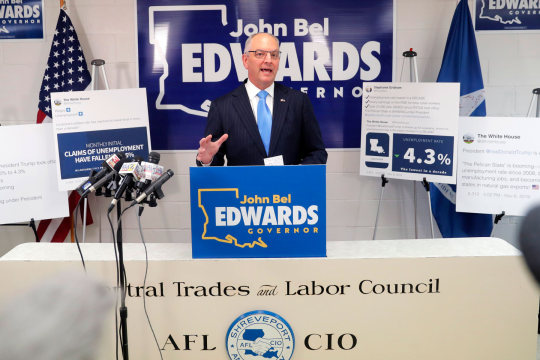
Louisiana Gov. John Bel Edwards, a Democrat, talks with reporters during a campaign stop in Shreveport, La., on Nov. 14. | AP
On Wednesday, Edwards met with voters and artists at Studio BE, in a warehouse in New Orleans’ Bywater neighborhood. He touted his local successes: Medicaid expansion, funding for education, low unemployment. He made a point of reminding his audience about Rispone’s previous criticism of New Orleans, an anti-urban talking point that Trump has made a staple of his attacks on Democratic leaders.
“[Eddie Rispone] asked me at our one and only debate in the runoff, ‘Why do you support New Orleans which is a sanctuary city?’ And my response was, ‘that’s a stupid question,’” Edwards said. “You support New Orleans because it’s a city in Louisiana that’s incredibly important to our state.”
Orleans Parish, which went 80 percent for Clinton in 2016, is one of the four parishes where early turnout has hit record levels for a nonpresidential year. Perhaps it is a chance to exact some political retribution against Trump that has motivated those voters. Edwards, though, has stuck with a critique of Rispone that hearkens back to recent Louisiana history, not national history.
“[Eddie Rispone] is trying to nationalize this race because that’s the only shot he has,” Edwards said. “He cannot win this race based on Louisiana issues because he hasn’t demonstrated any knowledge about how state government works, he doesn’t have any vision for the state of Louisiana, and to the extent that he has spoken in any specificity about his policy proposals they sound an awful lot like warmed-over failed policies of [former Governor] Bobby Jindal that ran our state so deep into the ditch.”
That ditch included a $2 billion dollar budget deficit and cuts to higher education funding—both of which Edwards reversed in his first term. Louisiana now has a budget surplus, and education funding has been restored.
Perhaps the most significant item on Edwards’ score sheet is expanding Medicaid. After Edwards’ predecessor, Republican Governor Bobby Jindal, refused to accept the Medicaid expansion offered by the Affordable Care Act beginning in 2014, it was one of the first things Edwards did when he was sworn in to office in 2017.
“And, bang, around 480,000 people who didn’t have health insurance got it. That’s unbelievably huge, that’s over 10 percent of the state population,” said Pearson Cross. “Not to mention roughly $12 billion in federal money coming to Louisiana as a result of Medicaid expansion. It was a no-brainer. You look at, well, we had a Republican governor who didn’t do that—Bobby Jindal—you want to go back there?”
Rispone has said, if elected, he would “freeze” Medicaid enrollment—potentially affecting the coverage of seasonal or shift workers, and effectively killing the program. In Kentucky, outgoing Governor Matt Bevin also threatened to cut Medicaid expansion in the state—which would have likely cost 400,000 people access to health insurance. Democratic Governor-elect Andy Beshear has promised to protect Medicaid in Kentucky (and, like Edwards, has promised a pay raise for teachers).
The scarlet letter on Edwards’ résumé is that he’s a Democrat in the deep red South. Successful record or not, he belongs to the wrong party—something Rispone and Trump hope to capitalize on. Rispone “says he wants to do what Donald Trump has done for the nation here in Louisiana,“ Cross said, “and that’s a message that resonates.”
Rispone—like Trump—is a businessman. His engineering and construction firm has made him one of Louisiana’s wealthiest citizens. He takes every opportunity—at debates, in commercials and at campaign appearances—to remind voters that he is not a career politician.
“Rispone doesn’t have a public profile, and he’s never held public office before, so when he announced [his candidacy] and released his first set of commercials, he made it clear that he was an ardent supporter of President Trump,” said Dr. Silas Lee, professor of public policy at Xavier University of Louisiana. “And considering this is a very red state that is very conservative on many issues, that made sense.”
“To the extent that Rispone has been successful at claiming the Trump mantle,” Cross adds, “I think he will be successful with many Republican voters in Louisiana, and conservative voters and people who like Trump.”
***
In the end, the race will likely be decided by supporters of Republican Rep. Ralph Abraham, the man who finished third in the October primary.
The final results of the October 12 primary had Edwards at 46.6 percent. Rispone, at 27.4 percent, edged out Abraham at 23.6 percent, to qualify for the runoff. Cross says those results indicate that Edwards is exceeding expectations for a Democrat in Louisiana.
Source link
The post Can Trump Win Governor of Louisiana? appeared first on News City Group.
from News City Group https://newscitygroup.com/can-trump-win-governor-of-louisiana/9811056/
0 notes
Text
Gov. Greg Abbott may be looking beyond Texas, as he runs even farther to the right

Texas Gov. Greg Abbott leads his staff on a neighborhood get-out-the-vote effort in McAllen, Texas, July 15. (Photo: Holly Bailey/Yahoo News)
McALLEN, Texas — It was not yet 10 a.m. on a recent Saturday morning when the doorbell rang. At first the man inside thought it was some Jehovah’s Witnesses calling, making their usual weekend rounds in his suburban neighborhood here in far south Texas.
But when he opened his front door, the man, who later introduced himself as Victor, seemed momentarily taken aback by what he saw. At least a dozen people, many with cameras and microphones, were crowding the tiny entryway of his modest brick home, while one photographer scrambled through the bushes like a wild animal to get a better vantage point. “The guy probably thinks we’re from Publishers Clearing House,” someone whispered.
But there were no giant checks, and no surprise jackpots. Just a man in a wheelchair right in front with big smile and a strong handshake, which he quickly offered up. “Hello,” he told Victor, grabbing his hand firmly. “I’m Texas Gov. Greg Abbott.”
It was officially day two of Abbott’s reelection campaign. Less than 24 hours before, the Texas governor had announced he would run for reelection in 2018. It was just a formality, though; the campaign had already been up and running for months, assembling the kind of political infrastructure not usually seen this early in a nonpresidential race. Abbott’s team has been working the ground game for months, canvassing neighborhoods across the state in what national party officials have described as one of the most advanced voter-targeting operations of any political campaign in the country.
And that’s how Abbott ended up here, rolling down Jasmine Lane in his wheelchair on a hot and sticky summer morning in one of the last remaining counties that still votes strongly blue in a flaming red state. While Abbott easily defeated his Democratic opponent Wendy Davis by 20 points during his race for governor three years ago, she trounced him here in the Rio Grande Valley by a margin as high as 30 points in some counties. It was a disappointing result for Abbott, who had visited the area dozens of times — more than Davis and more than any Republican before him — trying to make inroads with an electorate that is heavily Hispanic. It’s an issue that is personal for Abbott: His wife, Cecilia, a former teacher, is a third-generation Mexican-American, the granddaughter of immigrants.

Texas Gov. Greg Abbott and his wife, Cecilia, speak to a potential supporter. (Photo: Holly Bailey/Yahoo News)
The Rio Grande Valley was the first place Abbott visited after launching his first campaign for governor, and nearly four years later, it was his first stop again, even as he has pursued an agenda that has grown distinctly more conservative and, in some cases, some have argued, anti-Latino. But Abbott hadn’t given up trying to win over voters here. “I have a vision. I have a goal that I intend to achieve,” Abbott bluntly told a group of volunteers who had gathered to go knock doors on his behalf. “Whether it be this election or some election in the future, my goal is to ensure that in my lifetime the Rio Grande Valley is gonna be voting Republican every single election.”
Abbott’s campaign had chosen this block in particular, as it was home to what an aide described as “soft Democrats” — moderate, swing voters they believed could be convinced to support a Republican. Steering his wheelchair down a bumpy sidewalk, Abbott, who is partially paralyzed from the waist down, seemed more hopeful about his chances than decades of voting data would suggest. “You can’t get someone’s support unless you ask,” he breezily declared as he rolled toward the next house trailed by his wife, a contingent of staff and security and a scrum of reporters. “So we need to ask.”
Even before he arrived here, Abbott’s campaign was already in full force — so well organized that many outside Texas have taken notice, wondering if there isn’t more on the governor’s mind than trying to flip Democratic counties in the far southern part of his state. As of June 30, Abbott had nearly $41 million in the bank for his campaign, $10 million of which he’d raised in the last few days of the month alone. It was a near-record haul for any statewide candidate at this point in the race, even though he has yet to attract any major opponent and is widely regarded to be one of the safest gubernatorial incumbents in the country. A Morning Consult poll released this week named Abbott as the seventh-most-popular governor in the country, with a 64 percent approval rating among likely Texas voters.
Abbott’s popularity in a fast-growing state that is as strongly identified with Republican politics as California is for Democrats has already sparked whispers among GOP insiders always on the lookout for who might be worthy White House material. Abbott’s aggressive reelection campaign has only added to the speculation about whether the governor, emboldened in part by the example of Donald Trump, has higher ambitions than another four years in the Texas statehouse.

Texas Gov. Greg Abbott greets supporters after declaring his bid for reelection July 14 in San Antonio, Tex. (Photo: Holly Bailey/Yahoo News)
“I wouldn’t put him in the category of he goes to bed at night dreaming of being in the White House because he clearly is a guy who enjoys being governor of Texas,” said Bill Miller, an Austin-based lobbyist and political consultant who has close ties to Abbott world. But after Trump’s victory last November, Miller noticed a change: “I felt at that time his national antenna had gone up. He’s the governor of Texas, and in the political field, the person who is governor from Texas, the most conservative state, it puts you in the profile [of White House hopefuls]. I think he started thinking about it.”
Another longtime GOP campaign hand was less circumspect — though he declined to be named to speak more freely. “Abbott is from the land of George W. Bush and Rick Perry, who both ran for president,” he said. “You don’t think he’s looking at the White House right now and thinking he can do so much better?”
Abbott, a former Texas Supreme Court justice who spent 12 years as the state attorney general before becoming governor, has the strict conservative credentials that many Republicans used to require for those considering higher office — at least in the days before Trump. And he already has close relationships with the Koch brothers and other heavyweight conservatives who were viewed as Republican kingmakers before Trump’s unlikely campaign for president upended the 2016 campaign and shook up the party.
What is telling is that Abbott did not seem so outwardly surprised by Trump. Though he had endorsed Sen. Ted Cruz, a close friend and political ally who had worked for him as Texas’ solicitor general in the GOP primary, Abbott did not criticize Trump in the way many others in his party did. Perhaps that’s because he had already been embracing issues that came to animate Trump’s surprising political rise, including calls for stronger border security, a crackdown on so-called sanctuary cities and efforts to limit the resettlement of Syrian refugees in the U.S.
While Trump’s efforts to deliver on those campaign promises have been caught up in a mix of politics and legal wrangling in Washington, Abbott has continued to push forward with little opposition, raising the idea that Trump’s vision for America may ultimately be implemented by state executives like him, not the White House.
In May, Abbott signed a law banning sanctuary cities, which threatens local officials not only with stripped state funding but jail time and removal from public office if they do not cooperate with federal immigration authorities. Known as SB4, the bill also included a controversial provision that allows law enforcement officers to question the immigration status of people they detain.

A supporter waits for Texas Gov. Greg Abbott to speak at his reelection campaign kickoff San Antonio, Texas, July 14. (Photo: Holly Bailey/Yahoo News)
Similar to Trump’s executive order signed earlier this year that sought to strip federal funding from sanctuary cities, the Texas law has prompted a flurry of litigation, including lawsuits from local governments including Texas’s four largest cities: Houston, Dallas, San Antonio and Austin. But unlike Trump’s order, which has been blocked by the courts and is currently under appeal, the law Abbott signed is set to take effect on Sept. 1, barring interference from the courts.
Abbott has seized on other issues that have been championed by Trump and energized his conservative base. He has argued against the resettlement of Syrians and other refugees in his state — though as governor of Texas he can do little but complain about what is largely a federal issue. And echoing Trump, Abbott has decried what he has described as “rampant voter fraud” across Texas, though only a few cases have actually merited prosecution so far.
Earlier this year, a Mexican national from Fort Worth was sentenced to eight years in prison for illegally voting in the 2012 and 2014 elections. The woman, who is a permanent U.S. resident and cast her ballot for Republican candidates including Texas Attorney General Ken Paxton, who prosecuted her case, said she believed she was allowed to vote and simply made a mistake. But Abbott pointed to her case as proof that “voter fraud is real and will be punished in the state of Texas.”
On some issues, Abbott is further to the right than Trump — though it’s unclear whether he is there out of personal conviction or the fear of being outflanked by other prominent Texas conservatives. That includes Lieutenant Gov. Dan Patrick, a fiery former talk radio host and tea party conservative from Houston who is the tonal opposite of the more restrained Abbott, who tends to operate with what a friend describes as a “judicial temperament.”
Their differences in style has led to criticism, even from Republicans, that Abbott has allowed Patrick too much control of the agenda in Austin. People close to governor insist he is leading, not following, but some also acknowledge the pressure Abbott has faced in keeping up with a party that has moved further and further to the right.

Supporters at Texas Gov. Greg Abbott’s reelection campaign kickoff, July 14. (Photo: Holly Bailey/Yahoo News)
“The biggest challenge for Abbott right now is the danger of getting flanked on the right, and he knows that,” a close ally of Abbott said. “And the atmosphere just keeps getting more and more conservative. You don’t think we can get anymore conservative, and then we do. And so he just has to keep going that way, to stay ahead of the needle.”
Abbott this week convened a special session of the state legislature to tackle unfinished business from last spring’s session, including the “bathroom bill” championed by Patrick that seeks to restrict which public restrooms transgendered Texans can use. The bill is modeled after a controversial law passed by North Carolina in 2016 and partially repealed by officials there earlier this year after widespread boycotts, including from the National Basketball Association, which pulled the All-Star Game out of Charlotte.
Abbott initially seemed to try to stay out of the fray as Patrick promoted the bill, which like the North Carolina law, has sparked threats of boycotts, including from the National Football League and dozens of corporations who have threatened to relocate jobs elsewhere. But he later signaled his support for the bill. When Patrick, who is head of the state Senate, failed to reach a deal with state Rep. Joe Straus, the moderate Republican speaker of the House, the governor called the state legislature back to work, with the bathroom bill as one of the leading agenda items.
Abbott has said the bill is necessary to clarify state law because of mixed signals from the federal government. But some in Texas have wondered if there are other political motivations at work. That includes persistent rumors that Patrick had considered a primary challenge against Abbott next year — something Patrick, who has announced his own bid for reelection, has repeatedly denied.
The Texas governor launched his reelection bid against the backdrop of the special session in what seemed to be a move to raise his public profile. In a shift, he’s threatened to publicly shame Republicans who break with his agenda, suggesting he might campaign against them next year — a move that was cheered by his most conservative supporters. He’s become more active on social media including Facebook and Twitter — where, like Trump, he seems to be trying directly engage and energize his base.
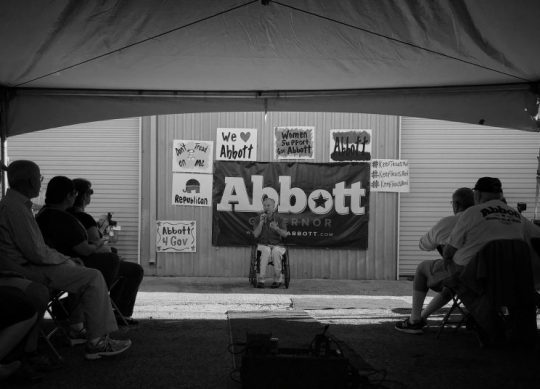
Texas Gov. Greg Abbott speaks to campaign volunteers in McAllen, Texas, July 15. (Photo: Holly Bailey/Yahoo News)
Asked about the ground game and fundraising, Abbott aides say the governor will eventually attract an opponent, and they want to be ready. “If you don’t run a campaign, you can’t win … whether we have a serious opponent or not,” said Dave Carney, a New Hampshire-based political operative who worked for Rick Perry before he signed as a senior advisor to Abbott.
On the stump, Abbott has been urging voters not to be complacent. In his announcement speech and later to supporters in McAllen, Abbott also cited concerns about an increasingly energized Democratic base in Texas — pointing to Trump’s 9-point win over Hillary Clinton in November, the smallest margin of victory for a Republican presidential candidate in 20 years.
Though they have worked hard for years to make inroads into what has unquestionably become one of the reddest states in the country, many Texas Democrats believe their party is still far from winning back significant ground in the state. Democrats haven’t held a statewide office in Texas since 1994 —the longest record of any state in the country. But you’d never know that listening to Abbott.
“Liberals are trying to mess with Texas,” the governor said in his announcement speech, pointing to places like Harris County, which includes Houston. He won there three years ago, but it went decidedly blue for Clinton last November, handing victories to other state and local Democrats on the ticket. Political observers cite changing voter demographics, including a growing Hispanic population that is expected to outnumber Anglos in the state within a few decades, and the influx of new voters from states like California, drawn to Texas by lower taxes and strong economic growth.
But Abbott attributed the results to outside forces like George Soros and House Democratic leader Nancy Pelosi — the familiar bogeymen for the right whose mere mention elicited loud boos from the governor’s supporters. “Liberals think they have found cracks in our armor,” Abbott warned.
As he spoke, a supporter waved a handmade sign that had been distributed by Abbott’s campaign, depicting a cannon that said, “COME AND GET IT.”

Texas Gov. Greg Abbott with a supporter in San Antonio, Texas, July 14. (Photo: Holly Bailey/Yahoo News)
The next morning, rallying supporters at a barbecue restaurant in McAllen, Abbott issued a similar warning. “We’re fighting for something that the liberals are trying to take away. And that is the freedom that Texas stands for,” he said. “If we were to lose Texas to the liberals, there would be no other place in the United States for people to go to for freedom. If we lose Texas, we lose America.”
Beyond Abbott’s conservative bona fides, he has a personal story that likely would play well on the national stage. In 1984, after graduating from Vanderbilt Law School, Abbott, who grew up in East Texas, moved back to Houston, where he had landed a job at a tony law firm. One day, while taking a break from studying for the bar, he went for a run and was jogging past a towering oak tree as it crashed to the ground.
A nearby Cadillac was flattened, and so was Abbott’s spine, nearly killing him. He was hospitalized for months and left paralyzed from the waist down. Doctors rebuilt his vertebrae piece by piece along with steel rods in his back.
When Abbott tells the story on the trail, he tries to do so with a little humor, telling voters that politicians promise all the time that they will have a spine of steel. “I really do have a steel spine,” the governor jokes.
Abbott’s disability makes him unusual — especially in Texas politics, where politicians are known for their swagger. But observing him, one quickly gets the sense that Abbott’s injury also motivates him to demonstrate his will and stamina. He operates with the air of someone who has something to prove.
Not by coincidence, the Texas governor kicked off his reelection on July 14—the 33rd anniversary of his accident. Though he made no mention of the date, Abbott rolled up a ramp to a specially lowered lectern, where he maneuvered around the stage shaking hands before delivering a 25-minute speech. Afterward, he worked the crowd longer than most politicians would, spending another 30 minutes posing for photos, leaning in for hugs and shaking the hand of everyone who approached him. He stayed until the very last supporter had cleared the stage, and then he rolled down a ramp and climbed into a waiting car on his own.

Texas Gov. Greg Abbott campaigning in McAllen, Texas. (Photo: Holly Bailey/Yahoo News)
It was a striking image compared to how aides to Franklin Delano Roosevelt discouraged and even outright forced reporters to refrain from showing the president, who had lost the use of his legs as a result of polio, in a wheelchair. Though Texas media has reported extensively on Abbott’s disability, some voters are still surprised to discover the governor’s paralysis.
During his get-out-the-vote effort in McAllen, Abbott rolled up the driveway of a Korean War veteran who was stunned to see the governor in a wheelchair. All the times he’d seen him on television, “I didn’t know you were paralyzed,” the man said, as he patted Abbott several times on the leg —explaining that was how troops would greet and honor comrades who had lost limbs in conflict. “Nice to meet you too,” the governor said.
Abbott’s political identity in Texas has been defined just as much by his willingness to take on Washington in the courts. Texas sued the Obama administration 48 times between 2009 and 2016, according to a tally by the Texas Tribune — with most of those lawsuits filed by Abbott himself. When he was running for governor in 2013, Abbott famously described his average workday: “I go to the office, I sue the federal government, and I go home.”
But having Trump in the White House has made it trickier for Abbott to present himself as a relentless warrior against Washington. Many of the regulations that he filed suit over, including rules from the Environmental Protection Agency, are in the process of being dialed back by the Trump administration, which means Abbott has less to complain about.
On the campaign trail and on the job, he rarely mentions Trump. In a radio interview earlier this week, he offered a rare critique of Trump’s performance so far, suggesting the White House needs some legislative accomplishments. “It’s like going through the first half of a football game without scoring a touchdown,” he told Austin’s KOKE radio. “You have to start putting some points on the board.”
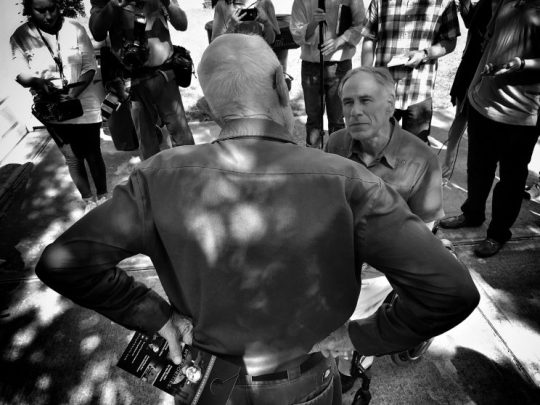
A man speaks to Texas Gov. Greg Abbott during a get-out-the-vote effort in McAllen. (Photo: Holly Bailey/Yahoo News)
But there are tensions. Last month, Paxton, the state attorney general and a close ally of Abbott, threatened to sue the Trump administration if it did not act to rescind a 2012 program approved by President Barack Obama that granted temporary work status to so-called dreamers — young undocumented immigrants who came to the U.S. as children.
The letter, which was co-signed by nine other Republican state attorneys general, called on the Trump administration to immediately cease processing new enrollees into the program and renewals. It came as Trump has publicly agonized over program — the fate of which he will personally decide, he told reporters on Air Force One last week.
At the same time, Abbott continues to champion one of his pet projects: a call for a new constitutional convention. Among Abbott’s proposals is an amendment that would allow a two-thirds majority of the states to override a Supreme Court decision and one requiring Congress to balance the federal budget.
Asked earlier this year if he still thinks a convention of states is necessary under Trump, he told reporters, “What is ailing America is far bigger than what any one president can fix.”
For the better part of an hour, Abbott rolled from house to house in McAllen, dodging low-hanging tree limbs and occasionally jetting into the street to avoid cracked sidewalks and driveways blocked by cars, as his entourage ran to keep up with him. Along the way, he stopped at five houses, cold calling on residents who seemed stunned to see the governor of Texas on their doorstep, asking for their vote. “I wish I had makeup on,” one woman told him. “But yes, you’ve got my vote.”
Even Victor, a Latino factory worker and registered Democrat, was won over, telling Abbott he backed his efforts to create jobs. “You’ve got my support,” he said.
Abbott aides have insisted their boss is focused on his reelection race and not beyond — and that his more immediate goal, in addition to winning a second term, is to expand the GOP’s power in places like the Rio Grande Valley.

A man pats Texas Gov. Greg Abbott’s leg during a get-out-the-vote effort July 15 in McAllen. The voter told Abbott he had never realized he was paralyzed. (Photo: Holly Bailey/Yahoo News)
“I honestly don’t think he has ambitions to go to Washington,” Carney said of Abbott. “I think he believes, and I’ve heard this privately and publicly, he has the best job there is in American politics.”
But Carney acknowledged he also didn’t see his former boss Perry running for president. “You never know, I guess,” he said. “But I just don’t think [Abbott] is driven by personal ambition in that way. He’s extremely ambitious and competitive about what he wants to get done, but it’s not personal ambition.”
By the time Abbott hoisted himself from his wheelchair into the backseat of a black car set to take him to another campaign event, he had gotten pledges from seven people to vote for his campaign, while some had even promised to volunteer. “Not bad,” he told his staff.
_____
Read more from Yahoo News:
News of John McCain’s illness broke during meeting to save GOP health care plan
Which health care bill are Republicans voting on next week? No one knows yet.
Kris Kobach pushes debunked theory on illegal votes: ‘We may never know’ who won
The not-so-radical Trump presidency
Photos: ‘Gaza Girls: Growing up in the Gaza Strip’ – Resilience in the face of adversity
#Greg Abbott#election#republicans#_revsp:Yahoo! News#_author:Holly Bailey#_lmsid:a077000000CFoGyAAL#_uuid:a991127c-87cd-3cd8-a843-29727f4509fe#texas#governor
2 notes
·
View notes
Link
Please please please.
"Early voting in the state this week reached a record volume in a nonpresidential year as the contest rises in statewide and national prominence. In a positive sign for Edwards, black voters made up approximately 31 percent of all those who cast their ballots early, a roughly 6-point bump from the share of black voters in the first round of balloting last month.
..."Early voting results also showed that Democrats made up a larger share of the electorate than in the first round of balloting.
...[T]he Democratic Governors Association went on a social media spree late this week to help buoy the incumbent.
"'.@EddieRispone’s policy ideas – or lack thereof — would bring Louisiana back into the Jindal days of $2 billion deficits and massive education cuts,' the group tweeted Thursday, referring to Edwards’s predecessor, former Gov. Bobby Jindal (R). 'Thanks to #LAGov @JohnBelForLA, Louisiana is moving forward.'"
Better late than never.
29 notes
·
View notes
Text
US midterms 2018: All previous updates | USA News
Click on right here for the newest updates on the US elections.
US voters go to the polls on Tuesday, November 6, to participate in midterm elections that can assist outline the remaining two years of President Donald Trump’s first time period in workplace.
All 435 seats within the Home of Representatives are up for grabs within the midterms, in addition to 35 seats within the Senate, and 39 governorships.
Trump’s Republican social gathering at the moment has a majority within the Senate and Home of Representatives, however failure to carry on to both may end in political impasse for the US chief’s most formidable insurance policies.
Explaining the US midterms:
Friday, November 2
Washington state lawmaker embroiled in ‘Biblical conflict’ controversy
Within the northwestern US state of Washington, a Republican state politician is going through backlash for distributing a doc outlining the rules for a “holy military” and advocating killing individuals who violate “Biblical legislation”.
With criticism mounting, some donors have requested state consultant Matt Shea to return their marketing campaign contributions.
Shea, who represents Spokane Valley in conservative jap Washington, is looking for a sixth time period within the state Home and has been below fireplace since he acknowledged in a Fb video final week that he had distributed a four-page doc titled, “Biblical Foundation for Struggle” to a few of his supporters.
The doc condemns abortion and same-sex marriage and says how those that do not comply with Biblical legislation ought to be punished, The Spokesman-Evaluation reported. At one level, the doc says, “If they don’t yield, kill all males.”
Nigerian military posts Trump video to justify lethal fireplace
The Nigerian military cited feedback by US President Donald Trump to justify opening fireplace on Shia protesters earlier this week.
Within the wake of the lethal violence earlier this week, the US embassy in Abuja urged the Nigerian authorities to “conduct an intensive investigation of the occasions and to take acceptable motion to carry accountable these answerable for violations of Nigerian legislation”.
However that didn’t cease the military from pointing to Trump’s feedback about Central American migrants and refugees as justification.
The military’s official Twitter account shared a video of Trump suggesting that US troopers may reply with power to migrants who throw rocks on the US border. “After they throw rocks … contemplate it as a rifle,” Trump mentioned within the video.
The video has since been deleted.
US activists confront far-right Republican over white nationalism
At a city corridor occasion on Thursday night time, Kaleb Van Fosson, a member of Iowa Residents for Neighborhood Enchancment, likened Steve King’s views to these of Robert Bowers, who has been charged with capturing lifeless 11 Jewish worshipers in a Pennsylvania synagogue.
“You and the shooter share an ideology that’s anti-immigration,” Van Fosson mentioned.
King interrupted him. “Don’t affiliate me with the shooter in anyway,” barked the Republican consultant, who’s at the moment in a neck-and-neck race for re-election in Iowa’s 4th Congressional District through the November 6 midterm elections.
US midterms: How widespread is voter suppression?
Since 2010, at the least 24 US states have launched new measures that place tight restrictions on voting. Most of these states are managed by Republicans.
Up to now eight years, in keeping with the Brennan Middle for Justice, 13 states launched or tightened restrictive voter ID legal guidelines, 11 have legal guidelines making it more durable for residents to register, seven in the reduction of on early voting alternatives and three moved to make it tougher to return voting rights to folks with legal convictions.
Most often, the measures disproportionately affected voters of color, who’re usually thought-about extra more likely to vote Democrat than Republican.
Thursday, November 1
Trump, Oprah lead surrogate campaigners in 2018 midterms
From President Donald Trump to Oprah Winfrey, prime political surrogates are fanning out in key battleground states to attraction to voters through the remaining days of the 2018 midterm campaigns.
Trump will rally his most loyal supporters in Columbia, Missouri, on Thursday night time to spice up the fortunes of Republican Senate candidate Josh Hawley in his razor-thin contest towards Democratic Senator Claire McCaskill. Vice President Mike Pence barnstormed Georgia for Republican gubernatorial candidate Brian Kemp, whereas Ivanka Trump jetted to Nevada for Republican Senator Dean Heller.
Democrats, in the meantime, enlisted Winfrey’s assist to encourage Democrats and crossover voters in Georgia’s race for governor.
Former Vice President Joe Biden was headed to North Dakota to assist Democratic Senator Heidi Heitkamp, who’s among the many most susceptible Senate Democrats and who has trailed Republican Kevin Cramer in public polling.
Avenatti launches political advert
Los Angeles lawyer Michael Avenatti, who represents adult-film actress Stormy Daniels and is contemplating a 2020 presidential bid, is launching his first political advert forward of the midterm elections.
The Democrat tweeted out a clip of the 80-second digital advert for The Struggle PAC. It contains a litany of people that warn that they’re “mad as hell and we’re not going to take it any extra” and are pissed off by “the lies”, ”the cover-ups” and “the bigotry.”
Avenatti then seems on digital camera and says, “Our structure says, ‘We the folks, not ‘Me the president,'” he says. “Arise. Be part of the struggle membership. Use your vote as your voice on November 6.”
Warren stumps for Richard Cordray
Massachusetts Democratic Senator Elizabeth Warren urged school college students in Ohio to vote for Democratic gubernatorial candidate Richard Cordray, praising him as “the nerd we’d like”.
The president has referred to as Cordray a “far-left disciple” of Warren, a possible 2020 presidential contender whom Trump ceaselessly mocks.
Cordray led the Shopper Monetary Safety Bureau that Warren promoted. He faces state Lawyer Normal Mike DeWine, a Republican, in a good race for governor.
Ivanka Trump hits marketing campaign path
Ivanka Trump was hitting the marketing campaign path for 2 Republican candidates within the closing days of the midterms.
In Reno, Nevada, the primary daughter praised Senator Dean Heller for the function he performed in passing the tax overhaul and the doubling of the kid tax credit score that got here with it.
Heller, who faces Democrat Jacky Rosen, mentioned that that is “an in depth race” however that he is by no means seen the Republican Get together in Nevada this well-organised in a nonpresidential yr.
Ivanka Trump was set to seem Friday with Iowa Governor Kim Reynolds in West Des Moines, serving to a governor with whom she has linked on workforce and schooling points.
Trump is a senior White Home adviser to her father, however each stops had been being made in her private capability.
Trump to additional limit asylum seekers with limits, tent cities
Lower than every week earlier than the midterm elections, US President Donald Trump mentioned his administration is finalising a plan that may deny asylum to people who cross the US border between official ports of entry.
Trump mentioned he can be signing an govt order someday subsequent week concerning immigration. He didn’t element the proposal or how it will be carried out.
Trump has been hitting the marketing campaign path onerous this week as he makes an attempt to energise his Republican base forward of the midterm elections.
He has sought to stoke concern over a caravan of Central American migrants and refugees making its solution to the US-Mexico border. The caravan continues to be greater than 1,100km away and isn’t anticipated to make it to the US border for weeks.
Trump attracts anger after ‘sickening’ anti-immigrant advert
A marketing campaign advert tweeted by Donald Trump associates a caravan of migrants and asylum seekers heading to the US border to a assassin on dying row.
Mexican citizen Luis Bracamontes was convicted of killing two police deputies in 2014. The advert shared by Trump begins with the opening line: “Unlawful immigrant, Luis Bracamontes, killed our folks!”
It then weaves between photographs of the killer and the caravan.
Trump, who has sought to drum up concern of immigrants earlier than the November 6 vote, tweeted the video with the textual content: “It’s outrageous what the Democrats are doing to our Nation. Vote Republican now!”
Outgoing Republican senator, Jeff Flake, referred to as the video sickening.
This can be a sickening advert. Republicans in every single place ought to denounce it. https://t.co/5sftOt57pI
— Jeff Flake (@JeffFlake) November 1, 2018
Variety of younger and new voters surges in Texas early voting
Upwards of 332,000 Texans between the ages of 18 and 29 have taken half in early voting, marking a 477-percent improve from the 2014 midterm elections, in keeping with a survey by the information firm Goal Sensible.
With greater than 214,000 folks voting for the primary time, Goal Sensible’s information additionally discovered that the turnout of African American and Latino voters greater than doubled because the 2014 midterm.
Donald Trump received Texas, historically a Republican stronghold, by 9 share factors through the November 2016 presidential elections, when he defeated Democratic candidate Hillary Clinton.
Obama and Oprah head to Georgia
Former President Barack Obama and speak present host Oprah Winfrey are heading to Georgia to marketing campaign for Democrat candidates, together with governor nominee Stacey Abrams.
Republican Vice President Mike Pence can also be within the state to attend rallies with Abrams’ rival Brian Kemp.
Kemp has drawn criticism for an obvious battle of curiosity and has up to now ignored calls to resign his place as Georgia’s secretary of state, a job during which he oversees an election he himself is standing in.
A number of polls present a statistical lifeless warmth between Kemp and Abrams, with a low share of undecided voters remaining. There is a risk of a December runoff, provided that Libertarian Ted Metz is additionally on the poll. Georgia requires that the winner garner a majority of the votes.
Greater than 23 million ballots forged already
That is in keeping with CNN, which has partnered with information firm Catalist. The pair discovered at the least 23,391,086 ballots had been forged both by early voting schemes or by mail voting.
The overall dimension of the US voters is 157.6 million folks, in keeping with the US Census Bureau, so the variety of votes already forged every week forward of the particular election is 15 % of the voters.
Wednesday, October 31
Purged Ohio voters allowed to take part
Federal judges ordered Ohio to permit voters who had been purged for not voting over a six-year interval to take part on this yr’s election.
A divided sixth US Circuit Courtroom of Appeals panel granted an emergency movement sought by voting-rights teams. The ruling overturned partially an October 10 ruling by a federal decide that mentioned voters have not been illegally purged from Ohio’s rolls.
Early voting surges in Florida
Greater than three.four million folks in Florida have already voted, surpassing the quantity who voted early or by mail 4 years in the past.
New statistics launched Wednesday by the state Division of Elections present registered Republicans nonetheless have the sting, casting 1.43 million ballots in contrast with practically 1.37 million by registered Democrats.
Greater than 1.48 million folks have voted early, and greater than 1.9 million folks have voted by mail.
Trump hits election path with risk of troop surge on border
President Donald Trump took his pre-election anti-immigration rhetoric to new heights on Wednesday with a surprising risk to deploy as many as 15,000 troopers on the Mexican border – equal to the scale of the US contingent in Afghanistan.
Brushing apart accusations that his divisive rhetoric on immigration is stoking “extremism”, Trump made the announcement earlier than kicking off a string of 11 rallies throughout eight states within the subsequent six days.
Trump has repeatedly – and with out proof – claimed that the US-bound caravan of largely Central American refugees and migrants consists of “harmful” folks.
“They don’t seem to be coming into our nation,” he mentioned of the newest group, just a few thousand people who find themselves nonetheless deep inside Mexico and much from the US border.
Who can be making historical past on election night time?
From the primary Muslim congresswomen to the primary brazenly homosexual governor of a US state, we take a look at the candidates who’re anticipated to – or may – make historical past on Tuesday.
Buyers brace for cut up Congress
The latest polls have the Democrats successful the Home of Representatives and the Republicans holding on to the Senate. These predictions include a significant caveat after all, as polls are ceaselessly confirmed incorrect.
Midterms aren’t normally a significant market occasion however, in keeping with this Reuters report, markets are making ready for the chance that Donald Trump can be coping with a deadlocked Congress, during which he won’t be able to power by way of any main coverage shift.
The results of such instability might be a drop within the valuation of some shares.
Is Nevada heading for a female-majority legislature?
Patricia Ackerman has gone from establishing a profitable enterprise, changing into an award-winning actress, working as an undercover FBI agent in Russia, to now presumably changing into a member of Nevada’s state meeting.
The Democrat is one among dozens of girls standing within the state’s legislature through the upcoming midterm elections.
Round 40 % of the state’s present legislature is feminine. Having a excessive proportion of feminine representatives “supplies a extra collaborative management”, in keeping with Congressional scholar, Jordan Tama.
Native American tribe sues North Dakota over Voter ID guidelines
The Spirit Lake Sioux tribe is suing the state of North Dakota over its voter identification necessities, which they are saying disenfranchises Native Individuals.
To forged a poll, voters in North Dakota want identification with a verifiable road deal with, one thing that is onerous to come back by on reservations.
The state maintains that everybody has a road deal with by way of the statewide 911 system, however the lawsuit filed by the Native American Rights Fund, the Marketing campaign Authorized Middle and two legislation corporations argues the system is “incomplete, contradictory and susceptible to error on reservations.”
The state’s voter ID legal guidelines had been tightened only a few months after the Democratic incumbent, Senator Heidi Heitkamp, narrowly received her seat in 2012 with the assistance of the Native American vote.
The Republican-controlled Legislature maintains the modifications weren’t attributable to Heitkamp’s win.
Tuesday, October 30
Dairy agency pulls help for Steve King over far-right help
Dairy cooperative Land O’Lakes has pulled its help for Republican Congressman Steve King in mild of his inflammatory feedback on race.
King has often drawn criticism and controversy for his views on race and immigration, which many have characterised as far-right.
As midterms marred by violence, consultants level finger at Trump
Consultants on the far-right say the run-up to this yr’s midterms has been one of the vital violent in dwelling reminiscence.
In simply the final week, 11 Jewish worshippers at a synagogue in Pittsburgh had been killed by a white supremacist gunman, and in Kentucky, two African Individuals had been shot lifeless in a grocery retailer by a person who spared white clients inside.
Trump took to Twitter accountable “faux information” for “nice anger” within the nation.
Trump plans to ‘terminate birthright citizenship’
US President Donald Trump has floated one other measure that can goal immigrants – ending birthright citizenship.
The Republican chief has lengthy complained of immigrants utilizing so-called anchor infants to ascertain roots within the US.
In an interview with “Axios on HBO”, Trump mentioned he needed to revoke the constitutional proper to citizenship for infants born in US territory.
The 14th Modification of the US Structure, launched in 1868, says: “All individuals born or naturalized in america and topic to the jurisdiction thereof, are residents of america and of the State whereby they reside.”
Any try by Trump to unilaterally finish the best would result in a protracted authorized battle and most authorized students suppose that he won’t be able to revoke the modification.
Moderately, the announcement appears consistent with Trump’s wider pre-election rhetoric towards immigration, together with his denunciations of a caravan of migrants and asylum seekers heading in the direction of the Mexico-US border.
Monday, October 22
Anti-Muslim campaigning within the US is a ‘dropping technique’: report
A report printed by the Muslim Advocates rights teams describes a swell of anti-Muslim marketing campaign rhetoric since US President Donald Trump took energy.
It documented 80 situations of “clear anti-Muslim rhetoric” employed by political candidates in 2017 and 2018, including that 64 % of the candidates held workplace earlier than or loved a presidential endorsement.
!function(f,b,e,v,n,t,s)(window, document,'script','//connect.facebook.net/en_US/fbevents.js');
fbq('init', '968100353246427'); fbq('track', 'PageView');
from SpicyNBAChili.com http://spicymoviechili.spicynbachili.com/us-midterms-2018-all-previous-updates-usa-news/
0 notes
Text
Please vote in the nonpresidential election years! And *please* remember good government starts at the *bottom*. Pay attention to local politics, and then, state. It's very important we make changes at the state and local levels!
millennials realizing that gen z can’t vote yet and we gotta step up and show up to the primaries this year in droves to keep the movement alive

72K notes
·
View notes
Quote
Mr. President, your tweet was beneath the office and represents what is wrong with American politics, not the greatness of America.
Senator Lindsey Graham (R-SC) was among the stream of Republicans condemning the two-tweet attack POTUS 45 made on MSNBC's "Morning Joe" co-host Mika Brzezinski.
#politics#45thesnob#GOP#MSNBC#Morning Joe#MikaBrzezinski#personalattack#nodignity#nonpresidential#beneaththeoffice
0 notes
Text
Trump and Republicans can count on Democrats in midterm elections
https://uniteddemocrats.net/?p=6395
Trump and Republicans can count on Democrats in midterm elections
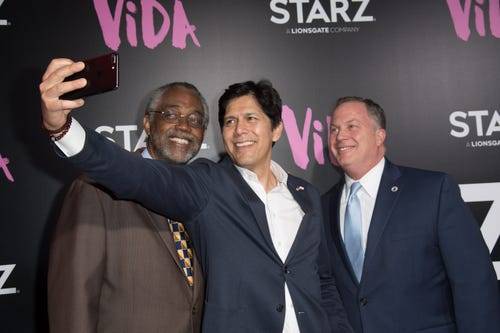
The Editorial Board, USA TODAY Published 6:48 p.m. ET July 19, 2018 | Updated 7:05 p.m. ET July 19, 2018
California Democratic Party’s endorsement of a candidate who lost to Dianne Feinstein just the latest potential misstep to November: Our view
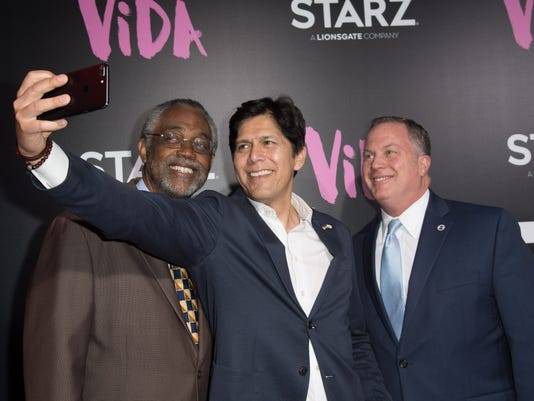
Kevin de Leon takes a selfie with fellow Democrats in Los Angeles.(Photo: Earl Gibson III/Getty Images)
With each passing day, it is easier to see the discomfort of Republicans and the growing confidence of Democrats who expect to rack up big gains in coming elections.
And why would this not be the case? President Donald Trump is taking the GOP down one dark alley after another and producing a string of cringe-worthy moments.
But if Republicans have reason for cheer, it is in the Democrats’ long history of undermining their own cause. This history includes an ongoing failure to develop a clear message, a seeming inability to get their base out to the polls in nonpresidential years, and a growing affinity for far-left candidates such as Bernie Sanders and Alexandria Ocasio-Cortez, a 28-year-old New Yorker who defeated the fourth-ranking House Democrat on an extreme platform that includes guaranteed government jobs.
CALIFORNIA DEMOCRATIC PARTY: Democrats work hard to stay united
The Democrats’ latest potential misstep is a jaw-dropping moment out of California, the nation’s biggest, and one of its bluest, states. For reasons that make no sense, the party there has formally endorsed Kevin de Leon for the U.S. Senate, despite the fact that the incumbent Democrat, Dianne Feinstein, shredded him in the primary.
In California’s “jungle primary,” all candidates run together, with the top two vote getters, regardless of party affiliation, advancing to the general election.
In the case of California’s race for the U.S. Senate, Feinstein finished first with 44.2 percent of the vote; de Leon was a very distant second with 12.1 percent.
The logical action would have been to endorse no one. A second option would have been to side with the candidate who won the primary by a ratio of more than three-and-a-half to one.
Alas, the state party decided that California is not liberal enough.
This act follows a national trend of liberals exercising power in ways that make little sense and violate basic democratic principles.
For example, the liberal wing of the party has pressured the Democratic National Committee to scale back on “superdelegates,” senior party officials who cast votes at the convention and could theoretically tip a close race for the nomination.
At the same time, they expect the party to retain the most undemocratic element of its nomination process: party caucuses.
These confabs, an alternative to primary elections, drive down participation significantly because they require voters to surrender 90 minutes or more at a time when they might have other commitments. But caucuses are adored by liberals because they heavily favor liberal candidates.
In the 2016 Democratic primaries, Hillary Clinton won everywhere but Wisconsin, Michigan and a handful of small states. But Sanders cleaned up in caucuses, winning 10 of 13, often by large margins that gave him significant delegate hauls not reflective of the overall view of the state. Something similar happened in 2008, though in that case, Barack Obama also won an impressive number of primaries.
The actions of liberals in California and nationally are problematic. They could anger more centrist Democratic voters. And they feed the argument that the two parties are equally controlled by their hardcore fringes.
If Democrats wanted to help Trump win re-election, they’d continue making decisions like these.
If you can’t see this reader poll, please refresh your page.
What do you think of our view on Democrats?
Read or Share this story: https://usat.ly/2uAuWx2
Read full story here
0 notes
Text
Stories and important tips on POS Hardware & POS.
Sedrick Huckaby’s paintings are all about giving depth to two-dimensional images, both literally and metaphorically. He employs what specialists call impasto technique, layering his paint up to three inches deep on the canvas so we can see his brushstrokes rise and swirl up from the plane of the canvas. It’s a style often associated with Vincent Van Gogh and other artists who have sought to share with viewers the emotions they felt while in the physical moment of painting.
With Huckaby, the abiding feeling imparted by his brushstrokes is empathy, a sense of human-to-human connection that can transcend vast gulfs of unfamiliarity, alienation, and disagreement. His typical subjects are traditional African American quilts and the people of his native North Texas region—family members, ordinary people, and the occasional well-known portrait-sitter. Huckaby’s portrait subjects appear to have their own gaze; viewers feel that we can perhaps read something of their souls. At the same time, we too feel probed, met, and called out of ourselves by the paintings. We enter a kind of silent dialogue.
For many visitors to Huckaby’s new one-room solo exhibition, which runs through December 5 at Austin’s Blanton Museum of Art, the big attraction is a new portrait of ex-president George W. Bush. In recent years, as he’s taken up the paintbrush as a retirement hobby, Bush has studied painting with Huckaby, who is a professor at UT-Arlington. In this canvas, we see the one-time commander in chief entrusting himself to his art tutor’s penetrating eye, posing in what appears to be a plain white T-shirt, skinnier than we remember him and more vulnerable. The heedless confidence around the eyes is still there, in blue impasto gobs, but it seems tempered as the sockets deepen and darken with age.
It’s a compelling piece, and certainly one that tells us more about the forty-third president than does his official White House portrait, in which the inner man is hidden by a thicket of impeccable tailoring and generic Oval Office trappings. To Huckaby’s knowledge, it is the only portrait of Bush painted from life; his official White House portrait was painted from photographs. But what’s most striking about Huckaby’s stripped-down take on Bush is its context in the Blanton exhibit.
Bush is just one of eleven people whose portraits are on display. The rest are neither famous nor powerful enough to start a war, yet they all look at us with an intensity equal to the former president’s. Their presence is just as large and as demanding of accommodation in our thoughts.
Four of the nonpresidential faces featured in Huckaby’s show make up a Hispanic family, in a work titled Soñadores (Three Pieces)—“Soñadores” is “Dreamers” in English. The title evokes the challenges faced by immigrant families whose members do not all share the same legal status and thus risk separation; Huckaby painted the two young children on separate canvases, alone and apart from their parents.
Sedrick Huckaby’s painting Soñadores (Three Pieces).
James Wilson

Sedrick Huckaby’s Filthy Rags of Splendor.
Courtesy of Sedrick Huckaby
The other six people we meet are from a series titled “The Huckabys,” for which the artist sought out nonrelatives in Fort Worth who share his last name. Some, like Huckaby himself, are Black, while others are white and perhaps Hispanic. In their eyes and expressions, their skin and the set of their jaws, their hairstyles, jewelry, and other adornments—and, more mysteriously, in the textures of Huckaby’s paint—we can trace the suggestion of varied life experiences and personalities. Though it is not made clear to the viewer, one is a self-portrait.
The forty-third president will attract the most attention, but the theme of the show is best captured by the only nonhumans on display. Huckaby’s other great subject is quilts, and he has included two quilt paintings in the show—one huge and ornate, the other smaller and more minimalist.
It’s tempting to draw the conclusion that Huckaby sees America, and North Texas in particular, like the first quilt: an expansive, warm patchwork of vibrant diversity. But the smaller companion, Filthy Rags of Splendor, which depicts the underside of a homely, tattered quilt hanging limply from its corners on a wall, complicates this interpretation of the exhibition. The unadorned quilt’s sagging shape subtly echoes both a typical crucifixion pose and Raphael’s iconic Renaissance work The Transfiguration, which is often understood to be about the transformative power of painting itself. It serves as a hint that Huckaby may be after a more spiritual affirmation of the dignity of each human life he paints.
There’s a lot to unpack when we leave Huckaby’s show—about how unequal power relations between those depicted do or don’t undermine a sense of universal empathy, about what the most frenzied impasto moments on the canvas are meant to emphasize, and about what precisely the almost-blank quilt is doing here.
Part of what makes Huckaby’s work so special is that it is not, at bottom, reducible to ideas. The human element—complex, multifaceted, and always capable of surprising—is what draws us close. It’s up to us not to look past that.
The above article was first provided on this site.
We trust that you found the above of help and/or interesting. Similar content can be found on our blog: easttxpointofsale.com Please let me have your feedback in the comments section below. Let us know what topics we should write about for you in future.
youtube
#Point of Sale#clover Pos Reviews#harbortouch Pos#harbortouch Support#lightspeed Pos Reviews#lightspeed Software#lightspeedhq#pos#shopkeep Support#toast Pos Support#touchbistro Support
0 notes